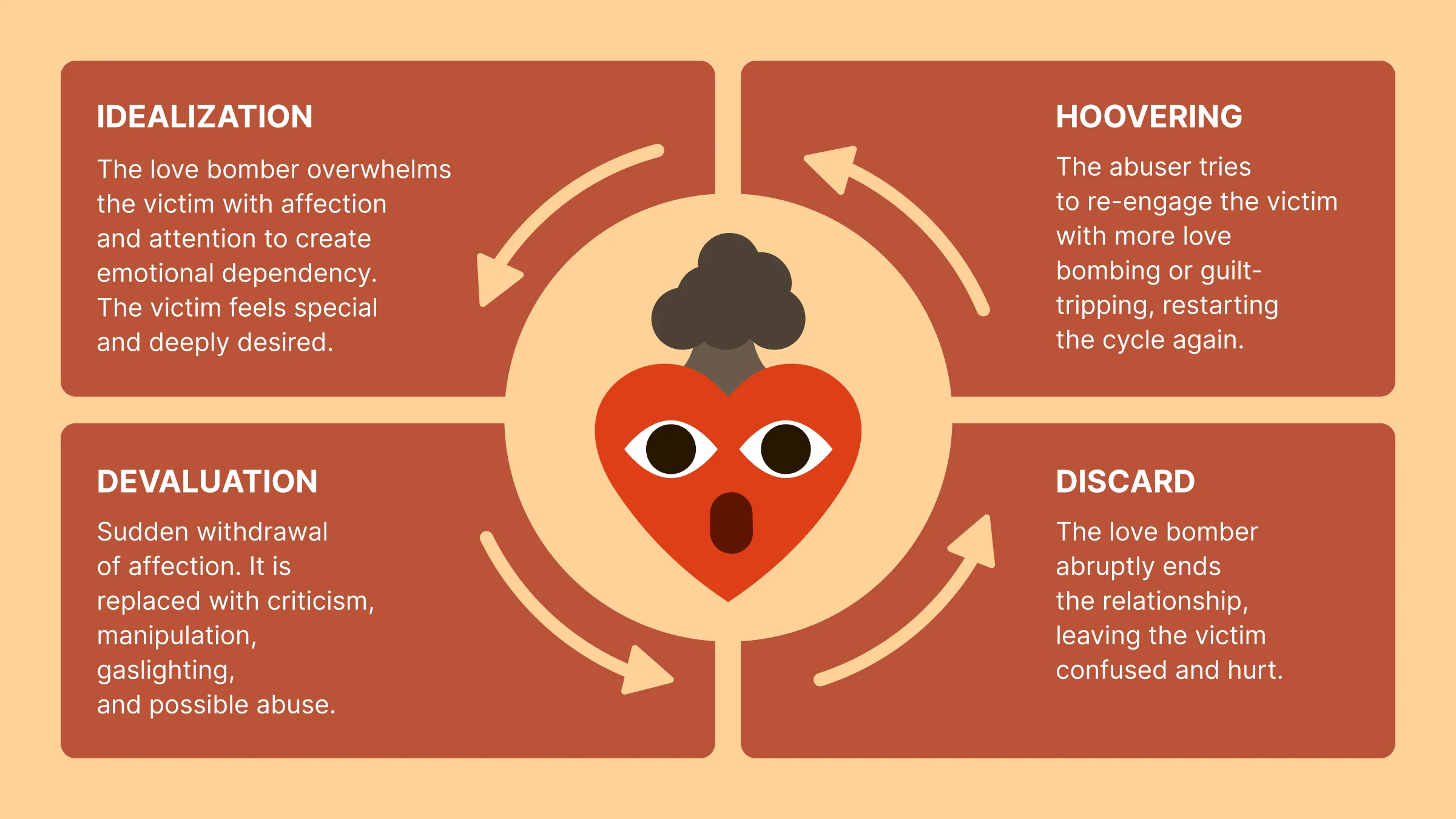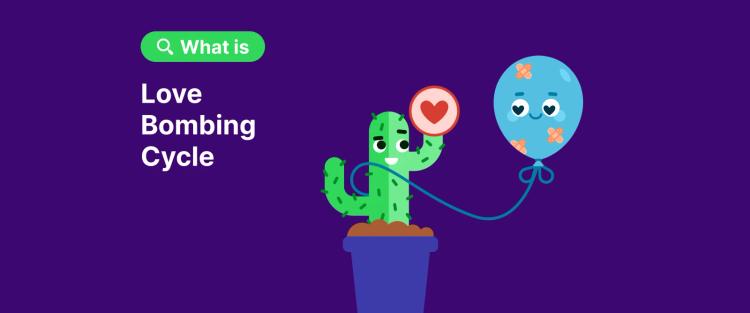Have you ever felt confused whether you are being swept off your feet or being manipulated? We've all heard of the 'honeymoon' phase in relationships — a time when you feel special, chosen, and hopeful about a love interest. But how can you trust if it's real?
A great way to decipher this question is to understand love bombing vs. genuine interest dilemma.
My name is Sophia Rodriguez, and I'm an EMDR-trained and bilingual Licensed Marriage and Family Therapist in California. And I'm here to tell you more about these concepts and their imapct on your relationships.
If you want to explore the questions of trust, love, and affection, you can find expert insights on the Headway app — a daily growth app with over 2000 book summaries and features to make your learning efficient.
Download the Headway app today and boost your relationship knowledge!
Quick summary: What insights you'll gain
It's normal to overlook red flags during this phase, as this person appears to be everything you might want in other ways.
However, the excessive affection and flattery might be the early stages of more concerning behaviors, such as:
Disregarding personal boundaries
Having unrealistic expectations
Devaluation
Avoidance
Emotional withdrawal
📘 Find out if it's real love or just a "honeymoon phase" trap on Headway!
How can you spot the red flags early: Quick quiz
Answer YES/NO to help you identify patterns that may signal love bombing or genuine interest. This quiz includes questions on over-the-top affection, fairy tale endings, future faking, grand gestures, true love, mutual respect, gaslighting, mental health, and many more.
What is love bombing, and why can it be dangerous?
Love bombing is when someone showers you with excessive flattery, affection, and admiration, often through affirming words, gifts, or grand gestures that signal strong interest.
It may feel more exciting and affirming than excessive at first, but it often becomes confusing over time. Especially when it's followed by a marked shift in behavior, such as reduced intentionality, devaluation, or emotional distance.
There are many reasons someone might idealize a connection with you. In my work as a therapist, I often see insecure attachment or unresolved trauma as key drivers behind love bombing.
Both those who engage in love bombing and those who are easily drawn to it, often overlooking the warning signs, tend to have an insecure attachment style.
📘 Learn to spot the difference between genuine affection and control on Headway!
However, love bombing can also be a manipulative tactic used in abusive relationships.
Victims of narcissistic abuse often find themselves trapped in a complex cycle reinforced by love bombing, gaslighting, and empty promises of change.
Individuals may be more susceptible to being manipulated in this way if they have unresolved trauma, typically ones that originate in childhood. As highlighted in 'Getting the Love You Want,' our romantic relationships are deeply influenced by childhood experiences, and these early experiences play a key role in how you give and receive love.
Insecure attachment, narcissistic abuse, and unresolved trauma are further explored in the 'Why Love Bombing Happens' section.
📘 Decode your partner's behavior and find clarity with Headway!
What is genuine interest? Curiosity, connection, and patience
Many unhealthy relationships endure because of fear of being alone or a deep desire to feel loved. In some cases, people may want to be with or remain attached to someone due to feelings of insecurity or emotional instability.
Genuine interest means the other person cares and intends to develop a relationship without an agenda.
It is grounded in curiosity and intention, rather than fear, insecurity, or manipulation.
Ulterior motives aren't always malicious; they often stem from unconscious patterns, like insecure attachment.
People may not even realize they are projecting their hopes or unmet needs onto you.
📘 Stop guessing and start knowing — master relationship red flags on Headway!
However, sometimes these motives do stem from more exploitative or manipulative tendencies where the focus is on gaining admiration or control rather than forming a mutual connection.
When someone love bombs a romantic partner, they may very well be more invested in the idea of being in a relationship than actually knowing you as a person.
They may derive excitement from feeling desired, attachment to someone, or simply the feeling of control. Not a foreseen risk of developing a connection.
That is why genuine interest usually moves more slowly: it's rooted in sincere curiosity and a desire to understand who you are as a person.
Authentic connection takes time to build, while love bombing tends to feel all-consuming and intense from the start.
Unlike love bombing, genuine interest isn't about securing your attention or affection; it's about creating a meaningful bond over time.
📘 Protect your heart from false promises with insights on Headway!
Love bombing vs genuine interest: Ten key differences
| Theme | Love Bombing | Genuine Interest |
|---|---|---|
Speed of affection | Moves very quickly — intense declarations, grand gestures, and fast attachment early on. | Unfolds more gradually. Feelings and trust are built over time through meaningful conversation and shared experiences. |
Intentions | Often driven by unmet needs, fear of being alone, or a desire for control. | Rooted in authentic curiosity and a desire to know you as a person. |
Respect for boundaries | Boundaries may be ignored, pushed, or minimized. | Boundaries are acknowledged, respected, and seen as essential to maintain a strong, healthy connection. |
Emotional reciprocity | May feel one-sided at times; the focus is on gaining affection and getting your attention, not mutual understanding. | Encourages mutual emotional investment, curiosity, and care. |
Consistency over time | Often inconsistent; intense highs in the beginning, followed by withdrawal or devaluation. | Steady and dependable behavior that aligns with words. |
Response to vulnerability | May rush or exploit emotional closeness to deepen attachment quickly. | Holds space for vulnerability with patience and empathy. |
Communication style | Can feel exaggerative or overly flattering, often lacking depth or balance. | Thoughtful and grounded, building emotional intimacy through real conversation. |
Reactions to conflict | May avoid, dismiss, or escalate conflict; can quickly shift to criticism or withdrawal. | Approaches conflict with curiosity and openness to work through it. |
Sense of autonomy | May feel like you're being swept into something too fast, without space to reflect. | Respects your individuality and encourages a life outside of the relationship. |
How it feels emotionally | May feel euphoric, overwhelming, and anxiety-inducing. | Feels safe, steady, and consistent. |
The psychology of love bombing: Causes and effects
Love bombing can be a sign of insecurity or manipulation, but it does not always indicate that genuine interest is missing.
It can stem from a variety of psychological patterns; some are done unconsciously, and some are intentionally manipulative.
1) Insecure attachment and unresolved trauma
For many people, love bombing begins as an unconscious attempt to quickly create a connection and emotional security.
Many individuals experience insecure attachment styles that are typically formed in childhood. Some are more anxious, while others are more avoidant.
When someone experiences emotional insecurity, they may flood a new partner with affection, praise, or intense closeness from the start.
On the contrary, those who have insecure attachment can also be more prone to falling for a love bomber's words without protecting themselves due to a similar desire to feel desired and connected to someone.
📘 Get the relationship reality check you need on Headway!
People are often unaware of how their attachment style affects their relationships, which is why it is more of an unconscious experience than it is manipulative.
Similarly, those with unresolved trauma may attach quickly and intensely, projecting their hopes and longings onto the relationship rather than moving with awareness and mutual pacing.
Falling for someone really quickly can satisfy unmet emotional needs and increase inner instability.
It can also increase self-esteem, as the honeymoon phase and love bombing can make someone feel wanted, chosen, and lovable.
📘Heal your attachment wounds and find secure love with Headway!
2) Idealization and projection
At times, love bombers can be more focused on the idea of a close emotional relationship than the actual person they are drawn to.
They are more likely to project a fantasy onto you rather than being clear on who you are as a real person.
Their projection will emphasize their desires, interests, and values in positive and reaffirming ways, only to start falling apart later on.
Consider this simple example: John is looking for a partner who enjoys golfing. He takes his date on a golf date, and she has a good time.
📘 Break the cycle of insecure attachment and build lasting bonds with Headway!
John is excited, which leads to idealizing the connection as a whole. He loves to bomb his date with affection, gifts, and flattery.
As time goes on, he might realize that the fantasy he projected onto you, his date, does not align with reality.
This reaction is common with love bombing, as people often project desires and hopes onto prospective partners.
We'll never live up to someone's fantasy of a 'perfect partner,' because no one is perfect.
So naturally, this projection typically meets reality in a gradual way, and people tend to devalue the individual whom they once idealized.
That is why someone who originally "love bombed" you may become more emotionally distant, withdraw, or stop putting in the same effort or affection that they did at the beginning of the relationship.
📘 Learn how childhood trauma shapes your love life on Headway!
3) Narcissism and abuse
In unhealthy or abusive relationships, a typical cycle emerges, where love bombing is used as emotional manipulation to increase emotional dependence or a false sense of hope:
| Phase | Description |
|---|---|
Idealization | Excessive praise, flattery, and affection. The victim feels special, chosen, and deeply connected. |
Devaluation | Subtle (or overt) criticisms begin. Gaslighting, blame, and confusion follow, leaving you second-guessing yourself. |
Discard | The narcissist may reject or abandon you, often cruelly or without emotion. |
Re-Idealization | The cycle will be repeated, often through apologies, flattery, and promises to change, while engaging in the same harmful behavior again. |
This cycle establishes emotional dependence through periodic reinforcement – providing just enough love or hope to create a hook.
This destabilization leads to questions about oneself and reality, which complicates the ability to leave the relationship or fully realize the impact.
Within the context of narcissistic abuse, love bombing is used as a powerful control tactic. These individuals may not "look" abusive at first, as narcissists tend to show up with charisma, confidence, and attentiveness.
📘 Transform your dating patterns with trauma-informed insights on Headway!
They may reflect your values and dreams at first, but when the idealization stage is over, they may start to devalue or deprecate your ideas.
The purpose of love bombing is usually just for them to be admired, to create further emotional dependency, or to enhance their self-image, and not to create a real, healthy bond.
All this to say, not all love bombing comes from a place of malice or manipulation. It might just stem from someone's insecurity and desire to feel loved, or it can be a warning sign of manipulation down the line.
Regardless of the context, love bombing tends to do harm.
The speed, intensity, and emotional high of love bombing can be disorienting, especially when it's followed by criticism, distance, or emotional manipulation.
📘 Move from anxious love to secure connection with Headway!
What can you do if you suspect love bombing: A brief guide
1) Set healthy boundaries
The purpose of a boundary is to protect our own wellbeing. It is not a punishment to anyone else or a selfish act.
Setting a boundary with someone else means that when they do xyz [something that crosses your boundaries], then you will do xyz [something to promote your wellbeing].
For example, "If you text me when I'm spending time with friends, then I won't respond so that I can be fully present." Clearly speak your needs, whether it's "I need some time to think," or "Let's slow things down."
A partner with whom you have a meaningful connection should respect your decision to set boundaries.
📘Build a relationship based on respect, not rush — learn how on Headway!
2) Gain perspective
A great way to gain a deeper understanding of your relationship is to share your experience with people you trust, like friends or family.
Oftentimes, loved ones can spot red flags faster than you can. You may also want to journal your feelings to track moments when you're feeling drained, thrilled, anxious, or confused.
Look for patterns and how this person makes you feel over time.
📘 Learn to set boundaries that filter out toxic partners on Headway!
3) Seek help
If you notice that you are more susceptible to being love-bombed, therapy is a great place to address your experience.
Therapy offers a space to heal attachment wounds and trauma. Consider somatic-focused or trauma-informed approaches like EMDR.
As an EMDR-trained LMFT who specializes in relationships, much of the work I do relates to this topic.
I work with individuals, families, and couples to earn secure attachment so that they are less susceptible to being a love bomber or being love bombed.
📘 Create a love life that feels safe and steady with Headway!
Therapy is also a great place to identify unhealthy or toxic patterns, such as the cycle of narcissistic abuse that I described above. Once we recognize and understand the cycle, then we can break free from it.
If you're not ready to start therapy, there are plenty of incredible resources to learn from. Want another topic like this? Try 'Getting the Love You Want' by Harville Hendrix, PhD, and Helen LaKelly Hunt, PhD.
📘 Discover the secrets to slow, genuine intimacy on Headway!
Are you experiencing love bombing? Self-check questions
To gain more clarity on whether you are experiencing genuine affection or clear signs of love bombing and manipulation, ask yourself these questions:
Do they overload you with gifts, compliments, or praise that feel overwhelming or too fast?
Do they express intense affection right away, before truly getting to know you?
Do they push for commitment early by talking about moving in, marriage, or being soulmates?
Do they text or call excessively and seem anxious or upset if you don't respond quickly?
Do they make you feel guilty or question your loyalty for wanting time alone or with others?
Does it feel like an emotional rollercoaster, with intense highs and intense lows?
Are you ignoring your gut instinct because it feels too good to question?
📘Empower yourself to choose partners who truly see you — start Headway!
Expert picks by Sophia Rodriguez: Summaries on attachment, trauma, and unhealthy relationships
I frequently suggest various books related to this topic to deepen my clients' understanding of attachment, trauma, and unhealthy relationships. Below are the two books I recommend the most.
To understand the role of attachment in relationships, try the 'Attached' summary
In the book 'Attached,' Levine and Heller explain how our bonds with caregivers shape our romantic relationships.
They explore three adult attachment styles: anxious, avoidant, and secure.
Anxious individuals crave intimacy and reassurance; avoidant people fear closeness and guard their independence; secure individuals balance intimacy and autonomy comfortably.
Applying this framework to love bombing helps explain why people with anxious attachment might leap into intense, fast-paced relationships.
📘 Don't settle for crumbs or chaos — demand healthy love with Headway!
To understand the effects of trauma, try the summary of 'The Body Keeps the Score' summary
In 'The Body Keeps the Score,' Dr. van der Kolk reveals how trauma is stored in the body and reshapes our nervous system, impairing our ability to feel present and safe.
He argues that talking is not enough to heal insecure attachment or trauma, as it often stems from unresolved trauma that requires healing through body-based therapies, like EMDR, somatic experiencing, and neurofeedback.
In the context of love bombing, those who experience trauma may be especially vulnerable or susceptible to forming unhealthy connections.
Make Headway your partner in understanding healthy relationships!
If you're feeling unsure about your relationship, you're not alone. Learning to tell the difference between love bombing and genuine interest can feel overwhelming and confusing, especially after experiencing narcissistic abuse or a toxic relationship.
It's common to second-guess your instincts, question people's intentions, or miss the intensity you once confused for love.
Throughout my work as a therapist, I've witnessed how individuals who heal their insecurities, trauma, and attachment have a stronger ability to spot the red flags described in this article.
Relationships are often more nuanced than this article describes, which is why seeking professional help can help you understand your specific situation.
There are plenty of ways to continue healing and learning, whether through psychotherapy, somatic work, or journaling.
If you're short on time and still seek new knowledge, try Headway. Learning from the trusted app that features book summaries on many theme-related topics can elevate your growth.
Download the Headway app and gain insights on relationships: red and green flags, love bombing, genuine love interest, and many more.
And lastly, please remember:
Embrace love that doesn't confuse you.
A love that isn't inconsistent, controlling, or manipulative.
A love that feels safe, steady, and secure.
May your heart feel seen and protected,
Sophia Rodriguez, LMFT
Frequently asked questions about love bombing vs genuine interest
What is the 3-month rule for love bombing?
The 3-month rule states that love bombing usually happens in the first three months of a relationship. Partner intimacy, warmth, and attention may seem to be overwhelming and intense at this time. After the first few months of a relationship, if there is little emotional depth or consistency, it could suggest love bombing, not actual interest.
How can I test for love bombing in my relationship?
To determine love bombing, watch for signs of hurried or insincere affection, particularly in the initial stage of your relationship. Notice if they respect your personal boundaries, reach out consistently, or show curiosity in your individuality. If there's pressure for a fast commitment or manipulation, then you could be experiencing love bombing.
What are the four stages of love bombing?
The four stages of love bombing are:
Idealization: Over-the-top love and praise.
Devaluation: Indirect insults or withdrawal when needed or requested.
Discard: Immediate break-up/rejection.
Re-Idealization: The cycle repeats with apologies and promises of change, creating emotional dependency.
What is the psychology behind love bombing?
Typically, love bombing is a psychological phenomenon that occurs out of insecurity, unresolved trauma, or narcissistic characteristics. It's designed to foster a bond incredibly quickly, making the other person feel special. Once the love bombing is over, the individual may feel confused and manipulated, leading them to be emotionally reliant and vulnerable.
How does genuine interest build trust in a relationship?
Genuine interest establishes trust by evidencing reliability and respectfulness. It is about patience, empathy, and showing a genuine desire to know someone better without pressuring them into a relationship or manipulating them. Over time, mutual emotional investment during communication fosters a foundation of trust and emotional safety.



















